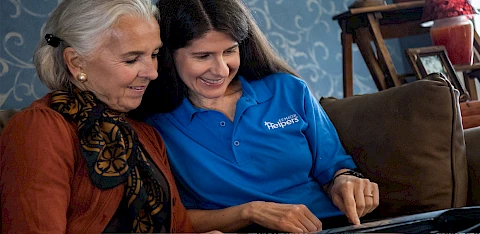
As parents age, adult children are often called upon to step into unfamiliar roles. Tasks surrounding finances, health decisions and managing the household and other responsibilities once handled by parents shift to the next generation. But offering help is not simply a matter of taking over. It involves a delicate adjustment of family dynamics. This process demands patience, sensitivity and respect.
The transition from child to care partner is emotionally complex. Families in Boston, on the South Shore and beyond are navigating changes like these every day. One of the most important things they can do is approach the process early, thoughtfully and with the right mindset. It’s not about control – it’s about collaboration.
The Importance of Timing
Many families delay difficult conversations until a crisis occurs. Reacting directly to emergencies like falls, hospitalizations and sudden diagnoses leaves little time for calm decision-making. That’s when tensions rise and relationships strain.
Planning ahead makes a critical difference. When conversations happen early, and while parents are still active participants in their care, it becomes easier to understand their priorities and preferences. These talks don’t need to be intimidating or formal. They can begin with simple questions like: What kind of care would feel supportive? What type of living arrangement makes you feel safe and independent? Are there specific things that matter to you as you age?
When these topics are explored openly, families have a better chance of honoring both the practical and emotional needs of everyone involved.
The Questions That Matter Most
Informed planning is about more than just knowing what insurance covers or what services are available. It’s also about asking the right personal questions that shape how decisions should be made.
These include:
- Are there written wishes about care preferences, tradeoffs and priorities? The conversation must begin with the wants of the care recipient. Any plan must start with a set of desired objectives and outcomes.
- Who should be consulted, informed and responsible for making future decisions?
- Are assets clearly documented, and are key people informed of how they are held?
- Have powers of attorney and healthcare proxies been established – and do those individuals understand their responsibilities?
- How will financial and healthcare disagreements be managed among siblings or extended family?
Even topics that seem small – like who has access to a family safe, where passwords are stored or who knows how to manage online accounts – become urgent if left unresolved. These conversations are deeply personal, but they are also necessary. Avoiding them only increases confusion later on.
A Better Way to Plan Care
At Senior Helpers Boston and South Shore, we help families take a structured approach to planning through our Age Friendly Care at Home certified approach and our proprietary Life Profile™ assessment. This tool looks at more than 225 factors that influence successful aging, from home safety and mobility to medical conditions and family caregiving capacity.
Every plan is developed under the guidance of a registered nurse and implemented by Certified Nursing Assistants (CNA) and Home Health Aides (HHA) who are thoroughly trained and vetted. Our approach is based on evidence, but it’s also grounded in compassion and respect for each client’s unique situation.
Taking the First Step
Starting these conversations is never easy. But waiting until the decisions are urgent makes the process much harder. The most successful transitions happen when families work together, long before outside help becomes a necessity.
By approaching aging as a collaborative process built on trust, communication and mutual respect, families in Boston and beyond can offer support that strengthens relationships rather than straining them.
We're here to help you take the next step with confidence. Call us at 617-500-6999 or contact us using the form here on our website to get started with Senior Helpers Boston and South Shore.